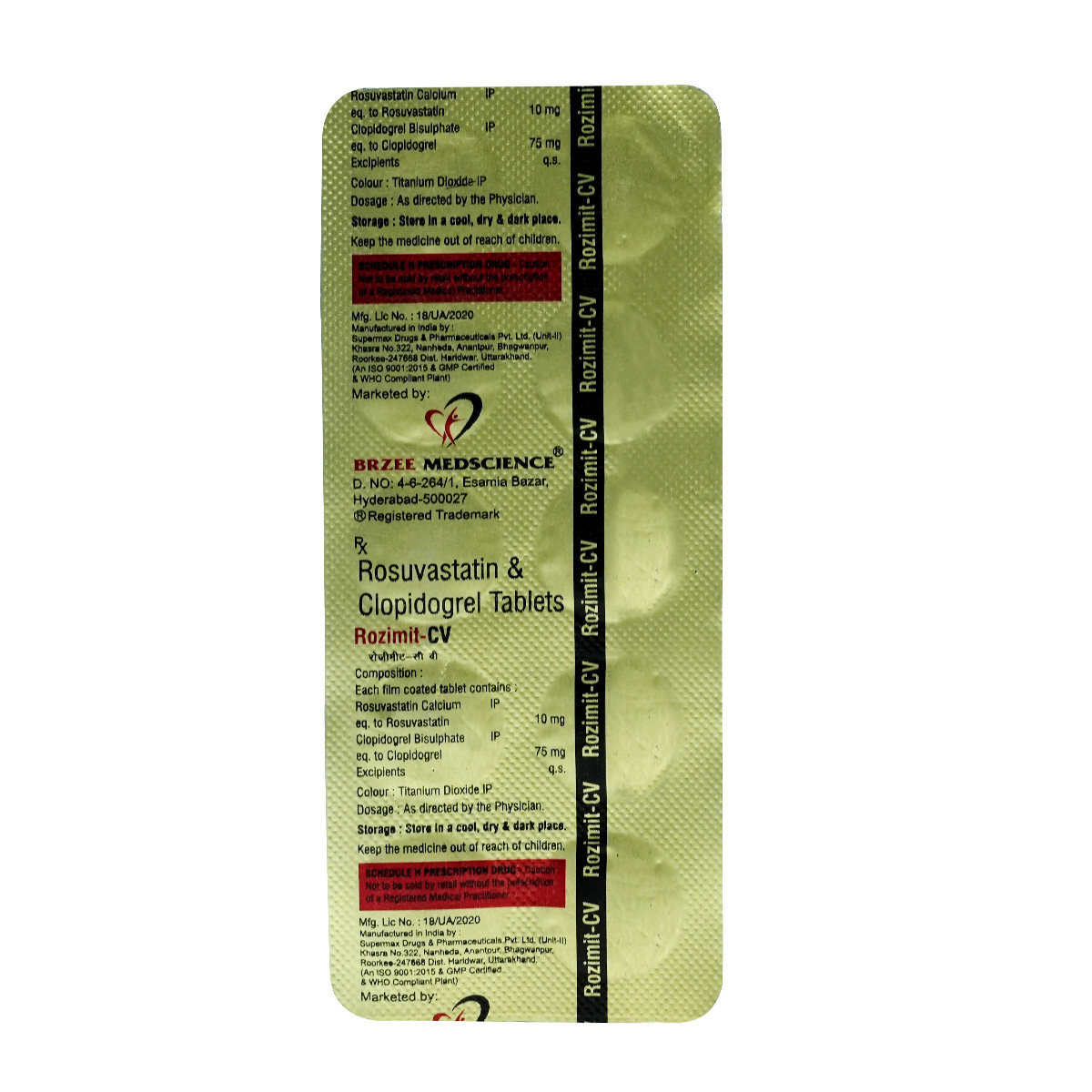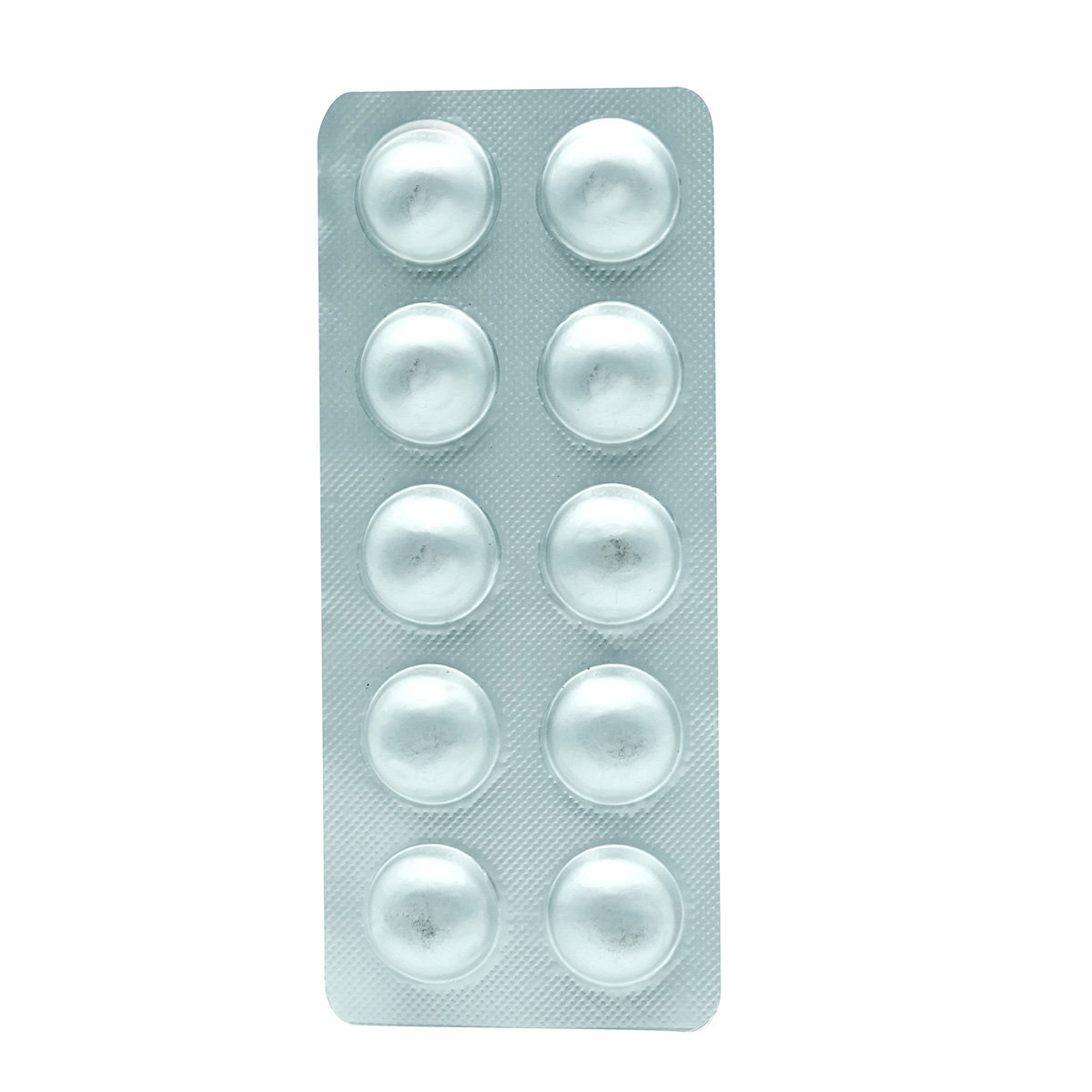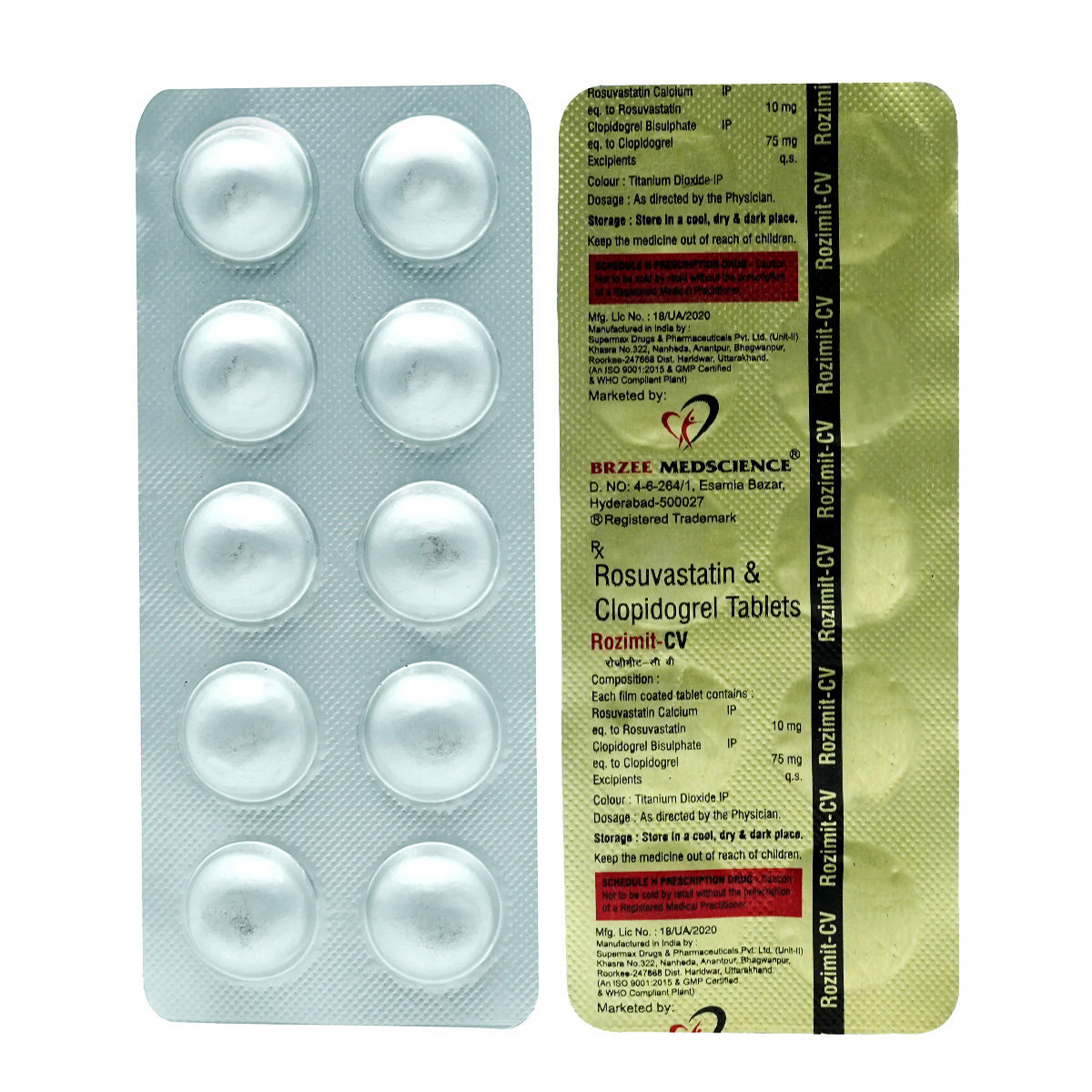Rozimit-CV Tablet 10's
MRP ₹178
(Inclusive of all Taxes)
₹26.7 Cashback (15%)
Know Your Delivery Time
Provide Delivery Location

Secure Payment

India's Most Trusted Pharmacy

Genuine Products
Composition :
Manufacturer/Marketer :
Consume Type :
Return Policy :
Expires on or after :
About Rozimit-CV Tablet
Rozimit-CV Tablet is a combination of two types of medicines: a statin and an antiplatelet. It is used to help prevent heart attacks, strokes, and chest pain (angina) in people who are at high risk of heart problems. A heart attack happens when the coronary arteries, blood vessels that supply blood and oxygen to the heart, become blocked by fatty deposits (plaques), including cholesterol. These plaques narrow the arteries, leading to atherosclerosis and coronary artery disease, which are the leading causes of most heart attacks.
Rozimit-CV Tablet contains two active ingredients that work together to protect your heart. Rosuvastatin lowers cholesterol production in the liver. It reduces bad cholesterol (LDL) and triglycerides (TG) while increasing good cholesterol (HDL). Clopidogrel is an antiplatelet medicine (blood thinner) that prevents blood cells (platelets) from clumping together and forming clots. Together, these medicines improve blood flow and reduce the risk of blocked arteries, helping prevent serious heart and brain complications.
Take Rozimit-CV Tablet exactly as prescribed by your doctor, usually once a day with or without food. Do not skip doses or stop taking the medicine without consulting a doctor. Common side effects may include headache, nausea, dizziness, swollen ankles (oedema), and in rare cases, slow heart rate. Most side effects are mild and go away on their own, but contact your doctor if they persist or worsen. If you miss a dose, take it as soon as you remember. If it’s almost time for your next dose, skip the missed one. Do not take two doses at the same time.
Do not stop taking Rozimit-CV Tablet without consulting your doctor, as stopping it suddenly may increase your risk of heart attack or stroke. Please inform your doctor of any medical conditions or allergies you may have before starting Rozimit-CV Tablet . Always inform your doctor that you are taking Rozimit-CV Tablet before any surgery or if a new medicine is prescribed. Rozimit-CV Tablet should not be used during pregnancy or breastfeeding, as it may harm the baby. It is also not recommended for use in children below 10 years.
Uses of Rozimit-CV Tablet
Rozimit-CV Tablet is used to reduce the risk of serious heart and blood vessel problems in people at high risk of cardiovascular disease. It is commonly prescribed for:
- Prevention of heart attacks: It helps lower LDL (bad) cholesterol and reduces the formation of blood clots that could block the coronary arteries.
- Prevention of strokes: It improves blood flow to the brain and decreases the risk of clot-related (thrombotic) events.
- Management of chest pain (angina): It enhances the blood supply to the heart muscles, relieving chest pain and discomfort caused by reduced blood flow.
- Slowing the progression of atherosclerosis: It reduces the buildup of cholesterol and plaque in blood vessels, helping to maintain healthy arteries.
- Secondary prevention of cardiovascular events: It is used in people who have already had a heart attack, stroke, or undergone heart procedures such as angioplasty or bypass surgery to help prevent future events.

Have a query?
Directions for Use
- Take Rozimit-CV Tablet with or without food as advised by your doctor.
- It is recommended to follow your doctor’s recommendations regarding the dosage and duration.
- Swallow it as a whole with a glass of water.
- Do not crush, chew or break it.
Medicinal Benefits
- Rozimit-CV Tablet effectively reduces the risk of heart attacks and strokes by lowering bad cholesterol and preventing blood clots.
- Slows the progression of atherosclerosis, helping keep arteries open and reducing cardiovascular strain.
- Provides dual protection. Rosuvastatin stabilises cholesterol plaques, while Clopidogrel prevents clot formation on them.
- Improves long-term cardiovascular outcomes in patients with coronary artery disease or those who’ve had angioplasty or bypass surgery.
- Lowers the chance of future cardiovascular events in high-risk individuals or those with a history of heart attack or stroke.
How Rozimit-CV Tablet Works
Storage
- Report to Your Doctor: Inform your doctor about the muscle pain, as they may need to adjust your medication.
- Stretch Regularly: Gentle stretching can help relieve muscle pain and stiffness.
- Stay Hydrated: Adequate water intake supports muscle health by removing harmful substances and maintaining proper muscle function.
- Warm or Cold Compresses: Apply cold or warm compresses to the affected area to reduce pain and inflammation.
- Rest and Relaxation: Adequate rest helps alleviate muscle strain, while relaxation techniques like deep breathing and meditation can soothe muscle tightness, calm the mind, and promote relief from discomfort.
- Gentle Exercise: Participate in low-impact activities, such as yoga or short walks, to improve flexibility, reduce muscle tension, and alleviate discomfort.
- Consult a physician: If your symptoms don't improve or get worse, go to the doctor for help and guidance.
- Please inform your doctor about joint pain symptoms, as they may adjust your medication regimen or prescribe additional medications to manage symptoms.
- Your doctor may prescribe common pain relievers if necessary to treat joint discomfort.
- Maintaining a healthy lifestyle is key to relieving joint discomfort. Regular exercise, such as low-impact sports like walking, cycling, or swimming, should be combined with a well-balanced diet. Aim for 7-8 hours of sleep per night to assist your body in repairing and rebuilding tissue.
- Applying heat or cold packs to the affected joint can help reduce pain and inflammation.
- Please track when joint pain occurs and any factors that may trigger it, and share this information with your doctor to help manage symptoms.
- If your joint pain is severe or prolonged, consult a doctor to rule out any underlying disorders that may require treatment.
- Drink water or other clear fluids.
- To prevent worsening of pain, limit intake of tea, coffee, or alcohol.
- Include bland foods like rice, toast, crackers, and rice in your diet.
- Avoid lying down immediately after eating as it may cause indigestion or heartburn.
- Avoid acidic and spicy food as it may cause indigestion.
- Take medications with food (if recommended): It can help prevent stomach distress and indigestion.
- Eat smaller, more frequent meals: Divide daily food intake into smaller, more frequent meals to ease digestion.
- Avoid trigger foods: Identify and avoid foods that trigger indigestion, such as spicy, fatty, or acidic foods.
- Stay upright after eating: Sit or stand upright for at least 1-2 hours after eating to prevent stomach acid from flowing into the oesophagus.
- Avoid carbonated drinks: Avoid drinking carbonated beverages, such as soda or beer, which can worsen indigestion.
- Manage stress: To alleviate indigestion, engage in stress-reducing activities like deep breathing exercises or meditation.
- Consult a doctor if needed: If indigestion worsens or persists, consult a healthcare professional to adjust the medication regimen or explore alternative treatments.
- Inform Your Doctor: Notify your doctor immediately about your diarrhoea symptoms. This allows them to adjust your medication or provide guidance on managing side effects.
- Stay Hydrated: Drink plenty of fluids to replace lost water and electrolytes. Choose water, clear broth, and electrolyte-rich drinks. Avoid carbonated or caffeinated beverages to effectively rehydrate your body.
- Follow a Bland Diet: Eat easy-to-digest foods to help firm up your stool and settle your stomach. Try incorporating bananas, rice, applesauce, toast, plain crackers, and boiled vegetables into your diet.
- Avoid Trigger Foods: Steer clear of foods that can worsen diarrhoea, such as spicy, fatty, or greasy foods, high-fibre foods, and dairy products (especially if you're lactose intolerant).
- Practice Good Hygiene: Maintain good hygiene to prevent the spread of infection. To stay healthy, wash your hands frequently, clean and disinfect surfaces regularly, and avoid exchanging personal belongings with others.
- Take Anti-Diarrheal Medications: If your doctor advises, anti-diarrheal medications such as loperamide might help manage diarrhoea symptoms. Always follow your doctor's directions.
- Keep track of your diarrhoea symptoms. If they don't get better or worse or are accompanied by severe stomach pain, blood, or dehydration signs (like extreme thirst or dark urine), seek medical help.
- Inform your doctor about the nausea and discuss possible alternatives to the medication or adjustments to the dosage.
- Divide your daily food intake into smaller, more frequent meals to reduce nausea.
- Opt for bland, easily digestible foods like crackers, toast, plain rice, bananas, and applesauce.
- Avoid certain foods that can trigger nausea, such as fatty, greasy, spicy, and smelly foods.
- Drink plenty of fluids, such as water, clear broth, or electrolyte-rich beverages like coconut water or sports drinks.
- Use ginger (tea, ale, or candies) to help relieve nausea.
- Get adequate rest and also avoid strenuous activities that can worsen nausea.
- Talk to your doctor about taking anti-nausea medication if your nausea is severe.
- Record when your nausea occurs, what triggers it, and what provides relief to help you identify patterns and manage your symptoms more effectively.
What if I have taken an overdose of Rozimit-CV Tablet
Drug Warnings
- Do not take Rozimit-CV Tablet if you are allergic to any of its ingredients.
- Do not use Rozimit-CV Tablet if you are pregnant, planning to become pregnant, or breastfeeding, as Rosuvastatin may harm the unborn baby and is strictly contraindicated during pregnancy.
- Avoid Rozimit-CV Tablet if you have active liver disease or any active bleeding conditions, such as stomach ulcers or brain haemorrhage, unless specifically advised by your doctor.
- Inform your doctor about all medications you are taking, especially antibiotics (like clarithromycin), antifungals (like itraconazole), HIV medicines, or blood thinners like warfarin, due to the risk of serious interactions.
- Tell your doctor you are taking Rozimit-CV Tablet before any surgery or if a new medicine is being prescribed, to avoid potential complications or interactions.
- Do not stop taking Rozimit-CV Tablet suddenly without medical advice, as this may increase the risk of heart attack, stroke, or other serious cardiovascular events.
Drug-Drug Interactions
Drug-Drug Interactions
Login/Sign Up
When Selexipag and Rozimit-CV Tablet are taken together, the body's ability to break down Selexipag may be reduced.
How to manage the interaction:
Taking Rozimit-CV Tablet with Selexipag is not recommended, please consult your doctor before taking it. They can be taken if prescribed by your doctor.
Taking Rozimit-CV Tablet together with mifepristone increases the risk of vaginal bleeding in women.
How to manage the interaction:
Although taking Rozimit-CV Tablet with mifepristone is not recommended, that would certainly result in interaction, it can be taken if a doctor prescribes it. If you experience prolonged and heavy bleeding, consult a doctor immediately. Do not discontinue any medication without consulting a doctor.
Taking Rozimit-CV Tablet together with argatroban can increase the risk of bleeding.
How to manage the interaction:
Although there is an interaction between Rozimit-CV Tablet and Apixaban, they can be taken together if your doctor has prescribed them. However, consult your doctor immediately if you experience any unusual bleeding or have other signs of bleeding, like feeling dizzy or lightheaded, red or black, sticky stools, or severe headaches. Do not discontinue any medications without consulting your doctor.
Taking Rozimit-CV Tablet with acalabrutinib may increase the risk of bleeding.
How to manage the interaction:
There could be a possible interaction between Rozimit-CV Tablet and Acalabrutinib, but they can be taken together if your doctor has prescribed them. However, consult your doctor immediately if you experience any unusual bleeding or have other signs of bleeding, like feeling dizzy or lightheaded, red or black, sticky stools, or severe headaches. Do not discontinue any medication without consulting your doctor.
Using dalteparin together with Rozimit-CV Tablet may increase the risk of bleeding.
How to manage the interaction:
There may be a possible interaction between Rozimit-CV Tablet and Dalteparin, but they can be taken together if prescribed by your doctor. However, If you experience any unusual bleeding or have other signs of bleeding like feeling dizzy or lightheaded, red or black, sticky stools, or having a headache consult your doctor without any delay. Do not discontinue any medication without consulting your doctor.
Coadministration of Rozimit-CV Tablet with Esomeprazole may reduce the effectiveness of Rozimit-CV Tablet.
How to manage the interaction:
Taking Rozimit-CV Tablet and esomeprazole together possibly has an interaction, but you can take these medications together if your doctor has advised it. Do not stop using any medications without talking to your doctor.
The use of ramucirumab together with Rozimit-CV Tablet may raise the risk of bleeding.
How to manage the interaction:
Although there is a possible interaction between Rozimit-CV Tablet and Ramucirumab, you can take these medicines together if prescribed by your doctor. If you notice these signs, contact your doctor immediately - feeling dizzy or lightheaded, dark or bloody stools, coughing, intense headaches, or weakness. Do not discontinue any medications without consulting your doctor.
Taking Rozimit-CV Tablet with Tirofiban can make the antiplatelet effects of Tirofiban stronger.
How to manage the interaction:
There may be a possibility of interaction between Tirofiban and Rozimit-CV Tablet, but it can be taken if prescribed by a doctor. Do not discontinue any medications without consulting your doctor.
Taking Rozimit-CV Tablet and Dasatinib together can increase the risk of bleeding.
How to manage the interaction:
Taking Rozimit-CV Tablet together with Dasatinib may result in an interaction, but they can be taken if prescribed by a doctor. However, if you experience dizzy or lightheaded, red or black, sticky stools, or a severe headache, consult a doctor without any delay. Do not discontinue any medication without consulting a doctor.
Taking Rozimit-CV Tablet together with Fondaparinux can increase the risk of bleeding.
How to manage the interaction:
There may be a possibility of interaction between Rozimit-CV Tablet and Fondaparinux, but they can be taken together if prescribed by your doctor. However, if you experience severe back pain, dizziness, black or red stools, severe headache, weakness, and vomiting, contact your doctor immediately. Do not stop using any medications without talking to your doctor.
Drug-Food Interactions
Drug-Food Interactions
Login/Sign Up
Diet & Lifestyle Advise
- Follow a Mediterranean or DASH diet rich in vegetables, fruits, whole grains, legumes, nuts, and healthy fats, such as olive oil, which has been shown to reduce the risk of cardiovascular events.
- Limit your intake of saturated fats and eliminate trans fats to lower LDL cholesterol and reduce your risk of atherosclerosis.
- Reduce sodium intake to less than 2,300 mg per day to help control blood pressure and lower the risk of stroke and heart disease.
- Engage in at least 150 minutes of moderate aerobic exercise per week, such as brisk walking, swimming, or cycling, to improve heart health and cholesterol levels.
- Quit smoking and avoid secondhand smoke exposure, as tobacco significantly increases the risk of clot formation and arterial damage.
- Limit alcohol consumption to no more than one standard drink per day for women and two for men, as excessive alcohol raises blood pressure and cardiovascular risk.
- Maintain a healthy weight (BMI 18.5–24.9); even modest weight loss improves cholesterol, blood pressure, and blood sugar control.
- Manage blood sugar effectively, especially in patients with diabetes, to prevent accelerated vascular damage and cardiovascular complications.
- Reduce chronic stress through techniques like mindfulness, relaxation, or yoga, and aim for 7–8 hours of quality sleep to support overall cardiovascular health.
- Take medications like Rosuvastatin and Clopidogrel exactly as prescribed, and attend regular medical check-ups to monitor lipid levels, clotting function, and overall cardiovascular risk.
Habit Forming
Therapeutic Class
All Substitutes & Brand Comparisons
RX
Rosuson-CV 10 Tablet 10's
Unison Pharmaceuticals Pvt Ltd
₹56
(₹5.04 per unit)
68% CHEAPERRX
Rosubeat CV 10 Tablet 10's
Zenolia Life Science Pvt Ltd
₹112.5
(₹10.13 per unit)
36% CHEAPERRX
Rosquel-CV Tablet 10's
Arkas Pharma Pvt Ltd
₹135
(₹12.15 per unit)
24% CHEAPER
Alcohol
Unsafe
Rozimit-CV Tablet should not be taken with alcohol as it may worsen your liver condition with increased secretion of liver enzymes like transaminase. Keep your doctor informed if you drink alcohol.
Pregnancy
Unsafe
Rozimit-CV Tablet contains Rosuvastatin, which is a pregnancy category X medicine. It may cause harm to both the pregnant mother and the fetus. Hence, it is not recommended for pregnant women and those who are planning for a pregnancy. Your doctor may prescribe it only in extreme cases.
Breast Feeding
Caution
Take Rozimit-CV Tablet only when prescribed, it is known to pass on in a limited quantity via breast milk to the child.
Driving
Caution
Drive with caution, Rozimit-CV Tablet usually causes blurry vision and may affect driving ability.
Liver
Caution
Rozimit-CV Tablet to be taken with caution, especially if you have a history of liver diseases/conditions. The dose may have to be adjusted by your doctor.
Kidney
Caution
Rozimit-CV Tablet to be taken with caution, especially if you have a history of kidney diseases/conditions. The dose may have to be adjusted by your doctor.
Children
Caution
Rozimit-CV Tablet is not recommended for children below the age of 10 years. The safety and effectiveness of Rozimit-CV Tablet have not been established in children due to limited testing of Rozimit-CV Tablet on children by competent authorities worldwide.
Heart
Rozimit-CV Tablet can be used in heart patients if prescribed by the physician to reduce the risk of heart attack and stroke. Please consult your physician if you have any concerns.
Geriatrics
Consult your doctor
Rozimit-CV Tablet should be used in elderly people only if prescribed by the physician.
FAQs
Rozimit-CV Tablet is used to prevent heart attacks and strokes in the future. It lowers the raised level of cholesterol and fats (triglycerides) in the body.
Rozimit-CV Tablet is composed of two medicines, namely: Rosuvastatin and Clopidogrel. Rosuvastatin is a lipid-lowering medication that inhibits the enzyme responsible for producing cholesterol in the body. As a result, it lowers the bad cholesterol (low-density lipoproteins or LDL) and triglycerides (TG), and increases the levels of good cholesterol (high-density lipoproteins or HDL). Clopidogrel is a blood thinner (anticoagulant) that collectively prevents the formation of clots in the blood vessels. Together, Rozimit-CV Tablet reduces the increased levels of bad cholesterol (low-density lipoprotein and triglycerides) and prevents blood clots, thereby reducing the risk of heart attack, stroke, and heart-related chest pain (angina).
Yes, Rozimit-CV Tablet contains clopidogrel that prevents blood clotting. It works by preventing platelets (a type of blood cell) from sticking together and forming clots, thereby preventing heart attacks and strokes.
No, Rozimit-CV Tablet contains Rosuvastatin, pregnancy category X medicine, and can harm both pregnant mother and unborn baby. Even if you are planning for pregnancy, tell your doctor that you are using Rozimit-CV Tablet .
If you accidentally take an overdose of Rozimit-CV Tablet , you may have liver problems (increased secretion of liver enzymes) and bleeding complications. If problems persist, please go to the nearest clinic or hospital immediately.
It would be best if you had total lipid profile (TG, HDL, LDL, VLDL, TC) and Blood coagulation tests like Complete blood count (CBC), Factor V assay, Fibrinogen Test, Prothrombin time (PT or PT-INR), Platelet count, Thrombin time and Bleeding time to analyze your blood clot timing and cholesterol level.
Do not drink grapefruit juice while taking Rozimit-CV Tablet . Grapefruit juice may increase the blood-thinning effect of your medicine.
Yes, prolonged use of Rozimit-CV Tablet may cause muscle diseases like myopathy and rhabdomyolysis. So if you feel any musculoskeletal pain after taking Rozimit-CV Tablet , consult your doctor about this issue.
Yes, taking Rozimit-CV Tablet can increase bleeding risk as it contains aspirin and clopidogrel, which belong to a class of blood-thinning agents. Therefore, please exercise caution when shaving, cutting fingernails or toenails, or using sharp objects to prevent bleeding. Before undergoing any surgical procedure, please inform your doctor that you are taking Rozimit-CV Tablet .
Consult your doctor before taking other medications while on treatment with Rozimit-CV Tablet to prevent any potential interactions. Let the doctor know if you are taking antibiotics, anti-HIV drugs, antifungal, blood thinners, anti-arthritis medicines, oral contraceptives, cardiac medicines or immunosuppressants.
If you are due to undergo any surgery or dental procedure, inform the doctor that you are taking Rozimit-CV Tablet . The doctor might ask you to stop Rozimit-CV Tablet before surgery as it might increase the risk of bleeding.
Follow a healthy diet and exercise regularly. Avoid smoking and alcohol consumption. Manage stress by doing meditation. Be cautious while using sharp objects.
It might be safe to use paracetamol while taking Rozimit-CV Tablet as other painkillers may increase the risk of bleeding. However, consult the doctor before using any painkiller medicines.
Side effects of Rozimit-CV Tablet include headaches, ankle swelling due to fluid retention (oedema), slow heart rate, and nausea. If the side effects are persistent, reach out to your doctor.
Country of origin
Manufacturer/Marketer address
Disclaimer
Author Details
We provide you with authentic, trustworthy and relevant information
Recommended for a 30-day course: 3 Strips












